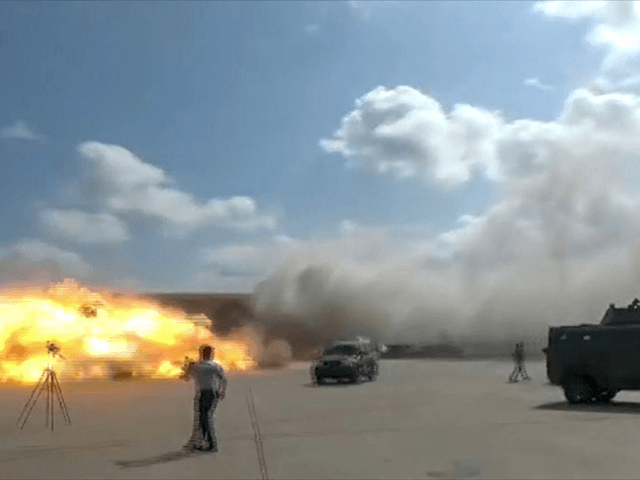A series of explosions killed at least 22 people at the airport in the southern Yemeni city of Aden on Wednesday.
Yemeni government officials denounced the blasts as a “cowardly terrorist attack carried out by the Iran-backed Houthi militia” and said it was a botched effort to kill Prime Minister Maeen Abdulmalik Saeed and his entire cabinet upon their arrival at the airport.
The Saudi-led coalition fighting to recapture Yemen from the Houthi insurgency launched retaliatory airstrikes against numerous targets on Thursday, including the airport in the capital city of Sanaa, which the Houthis have held since 2014.
Eyewitnesses described Wednesday’s explosions at the Aden airport as a string of several blasts in quick succession that erupted soon after a plane carrying Prime Minister Saeed and his cabinet landed. The cabinet was in the process of deplaning to be greeted by a crowd of supporters when the attack occurred. Some eyewitnesses reported hearing gunfire after the explosions.
A Yemeni security official said the explosions were caused by three mortar rounds hitting the airport terminal, while Saudi media displayed a video that purportedly showed a missile striking the airport. The Houthis have launched missile attacks against airports and other soft targets in the past, often using weapons that were likely provided by Iran.
The International Committee of the Red Cross (ICRC) said three of its staffers were among the 22 people killed in the explosion. Yemeni media reported an undersecretary of the labor ministry was killed and the deputy ministers of youth sports and transportation were injured. Over 60 injuries were reported as of Thursday.
“We and the members of the government are in the temporary capital of Aden and everyone is fine,” the prime minister said via Twitter after he and the cabinet were evacuated from the airport. “The cowardly terrorist act that targeted Aden airport is part of the war that is being waged against the Yemeni state and its great people. It only increases our determination to carry out our duties.”
“We assure the people of our great people that all members of the government are fine, and we affirm that the cowardly terrorist attack carried out by the Iranian-backed Houthi militia against Aden airport will not deter us from carrying out our patriotic duty and that our blood and soul will not be more precious than the blood of Yemenis. We have mercy on the souls of the martyrs, and we wish the injured a speedy recovery,” Yemeni Minister of Information, Culture, and Tourism Muammar al-Eryani said in his own Twitter post on the attack.
One of the arriving cabinet members, communication minister Naguib al-Awg, said the attack was meant to hit the prime minister’s aircraft but failed because the inbound flight was delayed.
“It would have been a disaster if the plane was bombed,” he judged.
Martin Griffiths, the U.N. special envoy to Yemen, condemned the attack as an “unacceptable act of violence” and a “tragic reminder of the importance of bringing Yemen urgently back on the path toward peace.”
Prime Minister Saeed’s reference to Aden as the “temporary capital” alluded to a rather delicate political situation, and the reason why a new cabinet was arriving in Aden on Wednesday. When the Houthis captured the capital city of Sanaa, Yemen’s government relocated to Aden, but then another separatist force called the Southern Transitional Council (STC) took control of Aden in 2019 and kicked President Abd-Rabbu Mansour Hadi and his government out of the city. Hadi’s government has been headquartered in Saudi Arabia since then.
On December 18, a new cabinet including both Hadi loyalists and STC members, along with representatives of the Muslim Brotherhood-affiliated, Saudi-allied Islah Party, was announced in Saudi Arabia and ordered to depart for Aden as quickly as possible. The Muslim Brotherhood, Islah Party, Saudi government, and Hadi government are Sunni Muslims, while the Houthis and their patrons in Iran are Shiites, a political-religious schism that drives a great deal of the violence in the Middle East.
The power-sharing arrangement was meant to reunite the broken anti-Houthi coalition and bring the STC, which had effectively seceded from Yemen in April, back into the fold. The Houthis, meanwhile, have consolidated their hold on northern Yemen and are looking forward to the end of U.S. support for the Saudi coalition under the incoming Biden administration.
The Trump administration was criticized on Wednesday for “rushing” a sale of $290 million in bombs to Saudi Arabia, among other last-minute arms deals. The critics maintain these bombs are destined for use in Yemen, where the Saudi coalition has been accused of causing excessive civilian casualties in its campaign against the Houthis.
On Thursday the Saudi-led coalition launched retaliatory airstrikes against multiple targets in the Houthi-occupied north, including the airport in Sanaa. Residents of Sanaa reported seeing warplanes over the city for several hours, while Houthi state television said at least 15 targets in the city were struck.
According to coalition officials, the Houthis not only tried to eliminate the entire Yemeni unity government at the airport on Wednesday, but they also sent a drone to bomb the palace they were evacuated to.
“The desperate, terrorist attack to target Maasheq palace confirms the responsibility of the terrorist, Iran-backed Houthi militia of the attack in Aden International Airport,” said a statement from the coalition.

COMMENTS
Please let us know if you're having issues with commenting.